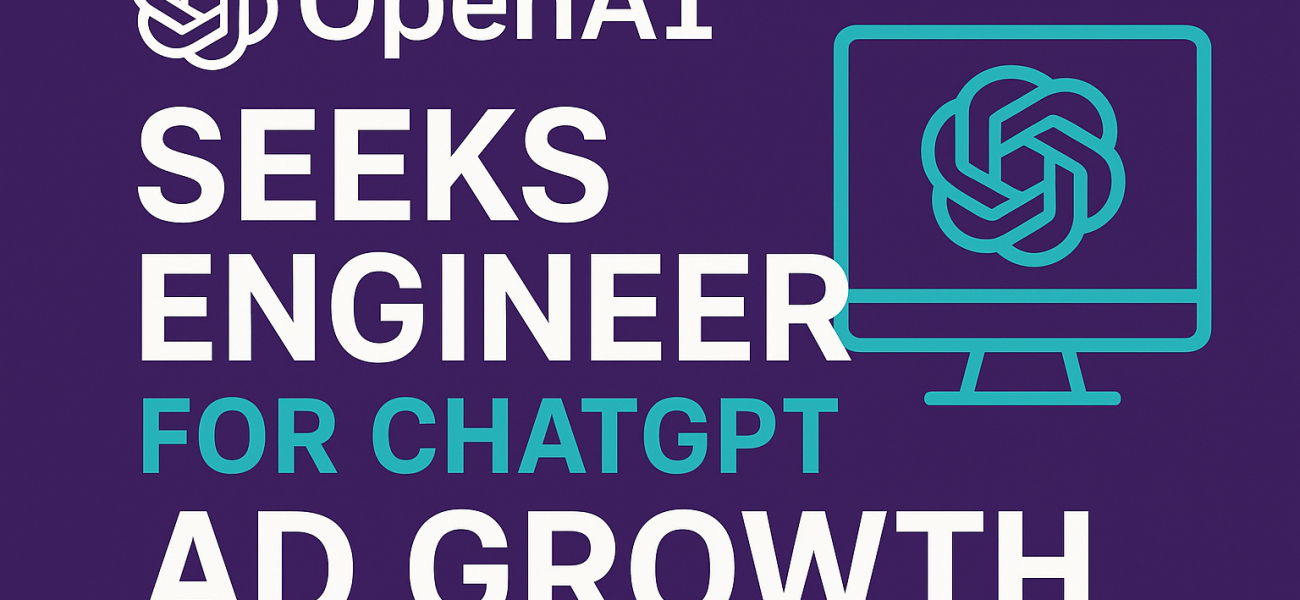OpenAI Expands Horizons: Hiring for Growth Paid Marketing Platform Engineer
In a groundbreaking move that could redefine the advertising landscape, OpenAI is actively seeking a Growth Paid Marketing Platform Engineer. This role is poised to play a crucial part in the development of tools aimed at ad platform integration, campaign management, and real-time attribution, forming the backbone of OpenAI’s proprietary paid marketing platform. Industry insiders believe that this initiative marks a significant shift in OpenAI’s trajectory towards monetization, particularly through its popular ChatGPT product.
Why This Move is Significant
The increasing attention on monetization strategies highlights that OpenAI aims to capitalize on its growing user base, especially in light of reports suggesting plans to implement advertising on the ChatGPT platform by 2026. As of August, ChatGPT boasts an impressive 700 million weekly users, making it a goldmine for advertisers and brands seeking to reach a wider audience.
The Push for Ad Infrastructure
To facilitate this vision, OpenAI is stepping up investments in building a robust advertising infrastructure. The listed job opening emphasizes the need for APIs, data pipelines, and innovative experimentation frameworks to optimize ad spending. These foundational elements are essential for advertisers who seek to leverage campaign performance metrics effectively.
OpenAI is setting the stage for an entirely new marketing ecosystem that could revolutionize how brands engage with audiences, says Dr. Emily Lawson, an AI marketing expert.
Defining the Role: What Does It Entail?
The Growth Paid Marketing Platform Engineer will play a multifaceted role within the emerging ChatGPT Growth team. In particular, the candidate will be tasked with designing systems that enhance marketing channels and improve spending efficiency. Specific projects anticipated for this role include developing intricate campaign management tools, integrating with leading ad platforms, and creating rigorous real-time attribution and reporting pipelines.
Integrating Technology with Creativity
Another aspect of this position is enabling experimentation frameworks designed to optimize advertising objectives. This signifies a shift towards a more data-driven approach in digital marketing. The ideal candidate is someone who thrives in ambiguity and can transform broad business goals into functional, technical systems effectively.
We need engineers who don’t just code but are also visionaries in creating frameworks that can adapt to the ever-changing dynamics of marketing, adds Fidji Simo, OpenAI’s chief of applications.
Implications for Advertisers and Brands
The broader implications of OpenAI’s advertising initiative could be extensive. By allowing brands to input their marketing goals, it is anticipated that ChatGPT could autonomously plan, buy, and measure campaigns. This automation could save brands a significant amount of time and resources while optimizing their ad spending in real-time.
A New Era for Paid Media Channels
As the ad product takes shape, advertisers will need to consider the potential of ChatGPT as a paid media channel. The ability to access such a large user base on a state-of-the-art AI platform could differentiate brands seeking innovative ways to reach their target demographics from their competitors.
What This Means for AI Marketing
The new direction taken by OpenAI may well signal a turning point in AI marketing strategies. Google Ads automation has set a precedent for efficiency in ad campaigns, but the ChatGPT framework promises a level of autonomy and adaptability that could set an industry standard.
Automation and Optimization: The Future of Advertising
Through the combination of AI and marketing technologies, brands could potentially achieve unprecedented levels of campaign performance. A central theme of this initiative is not only automation but also the sophisticated analysis of campaign data, ensuring that brands get the maximum return on their investment.
The integration of real-time data analytics into marketing platforms will fundamentally change how brands approach ad spend, notes marketing strategist Jason Reed.
Building a Strong Foundation for Future Advertising
As OpenAI embarks on this ambitious journey, the importance of establishing a solid MarTech infrastructure cannot be overstated. The systems developed today will define how brands interact through paid media channels, especially in the context of a platform like ChatGPT, which integrates conversational AI into the advertising framework.
The Need for Expertise in Ad Technologies
For this initiative to succeed, it will require not just engineering skills but a deep understanding of marketing nuances as well. This dual expertise is essential when balancing creative advertising strategies with the technical demands of API integration and data management.
Conclusion: Potential Transformation on the Horizon
As OpenAI continues to build its advertising capabilities within ChatGPT, the landscape of digital marketing is set for profound changes. With expectations of enabling automation that could transform how campaigns are managed and executed, the role of a Growth Paid Marketing Platform Engineer is pivotal to realizing this vision. Advertisers and marketers alike should remain vigilant, considering how they can position themselves within this evolving framework of AI-driven marketing solutions.
In a world where digital touchpoints are ever-expanding, the innovation brought by OpenAI to the realm of paid advertising could not only enhance campaign performance but also redefine the strategies brands use to connect with consumers across various platforms.


